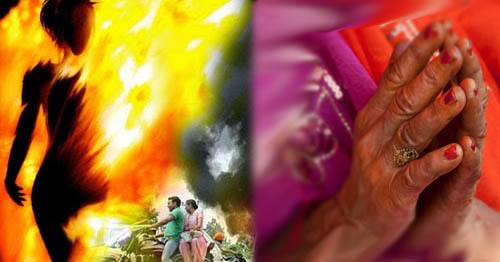Society needs laws! Society cannot sustain itself without these “definitive laws” and these cumulative laws affect the society in many different ways. Having definitive laws maintain the balance in the society and is essential. Some laws may be good for the society at large and some laws may not; but a law (whether good or bad) has an impact (whether good or bad) on the lives of the people.
Of course, the first question that comes to mind is…what is “law”? “Law is simply a system of rules that are enforced through social institutions to govern human behavior”.

Although all the laws have social implications but some are more important than the others. Let us look at some of the important socio-legal issues in India right now.
The first issue that comes to mind certainly has to be “women fighting to enter temples and mosques” for their right to pray, while these places of worship have traditionally refused the entry of women in the name of religious tradition. This, of course, is a controversial topic as many are “for” it and many still firmly stand “against” it. But in a country like India where there are many other issues plaguing women (domestic violence, property rights, financial stability, education, empowerment, etc.), is this really the focal point of the ‘feminist’ debate?!? It really makes me wonder then…what about the popular concept of…“the omnipresent God”…because if God was indeed “omnipresent”, what then is all this hue and cry about entering temples and other places of worship.
Besides, many of these temples have separate arrangements for men and women. What’s ironic is that these days, women are fighting to enter areas in a temple which are specifically reserved for men. But I wonder if we have paused to think as to why it was done in the first place?!? Can the possible answer be…so that women would have a separate place to worship so that they can worship in peace and safety without a threat of molestation and inappropriate touching. I am not saying that women should not fight for their rights but is this one particular right so important? I, of course, leave this to be wisdom of the readers…and hope the women of this country find the economic and social emancipation that has long been denied to them.
Another “burning” issue that is creating ‘news’ is the current prohibition on liquor in the state of Bihar by the Maha-gath-bandhan comprising the J.D.U, the R.J.D. and the Congress, spearheaded by controversy’s favorite child, IAS K.K. Pathak (If you don’t know him, ask the people of Maharashtra). Well, coming back to the latest social experiment concerning the liquor ban, there are several countries and states that have already tried imposing a complete ban on liquor consumption. So, have they succeeded in their lofty socio-legal endeavour? Well, the answer is a simple “NO”.
As history shows, a legislative ban on liquor has never worked. So, why should it be any different now?!? If you’re still not convinced, let me take you back in history, when there was a complete ban on liquor in the United States of America from 1920 to 1933. In the era of prohibition, organized crime received a major boost. “Bootlegging” emerged in response to prohibition and the finances kept rolling in and gave huge impetus to organized crimes syndicate – popularly referred to as the “Mafia”.
This can also be seen in the case of Maharashtra where prohibition resulted in the creation and propagation of the “Underworld”. Moreover, even after a complete prohibition, the people still managed to procure alcohol from unauthorized (albeit dangerous) sources. Take Gujarat, for example, which also has prohibition since independence but is now called the “wettest” “dry” state in India.
However, the most interesting thing about the prohibition “sequel” (that’s right – this is Bihar’s second experiment with prohibition) in Bihar, is the absurd quantum of punishment, which is completely in contravention to the Principle of Natural Justice. Do you know what’s the punishment in Bihar for even keeping a teaspoon of alcohol? According to the Act, the “term of punishment [is to be] not less than 10 years but which may extend to imprisonment for life with fine which shall not be less than one lakh rupees but which may extend to ten lakh rupees”. The Nitish-led government has failed to realise how many people will lose their lives owing to this ban. This is because when an alcoholic is in withdrawal, he becomes aggressive and is likely to lash out violently. This would further jeopardise the lives of the close family members (which mostly includes women and children). Secondly, addicts are likely to consume “anything and everything” in the hope of the elusive “high”. This too can prove fatal, as was confirmed by a leading doctor in state, who recently recounted how a 30-year-old young man collapsed on the hospital floor (even as emergency services were wheeling in a stretcher). He had consumed an “unknown” product. It really makes one wonder — who are we trying to help?!?
Last but certainly not the least, the most important sociolegal issue to confront the collective morality of the nation is the Juvenile Justice Act. Post the Nirbhaya incident, protests ran galore as to how the most brutal of killers would walk free…simply because he was not 18 years of age and was to be treated as a juvenile. What it effectively means is that a young boy can go and commit heinous crimes like rape and murder but he will escape maximum punishment simply because he was not a major on the date of the commencement of the crime. What’s funny is that he will be treated as a minor if he is 17 years 364 days, but he will be treated as an adult if he is 17 years 365 days. Thus, a mere day changes his fate. Not to mention that even the most heinous of crimes only attracts a maximum punishment of 3 years. This is a primary reason why there has been a steady increase in juvenile crimes.
Of course, there are innumerable socio-legal issues that currently plagues this nation. After all, our legal system itself is flawed and is in fact, one of the slowest judiciaries in the world. The pace at which the legal process moves in this country is truly saddening. After all, “justice delayed is justice denied”!































